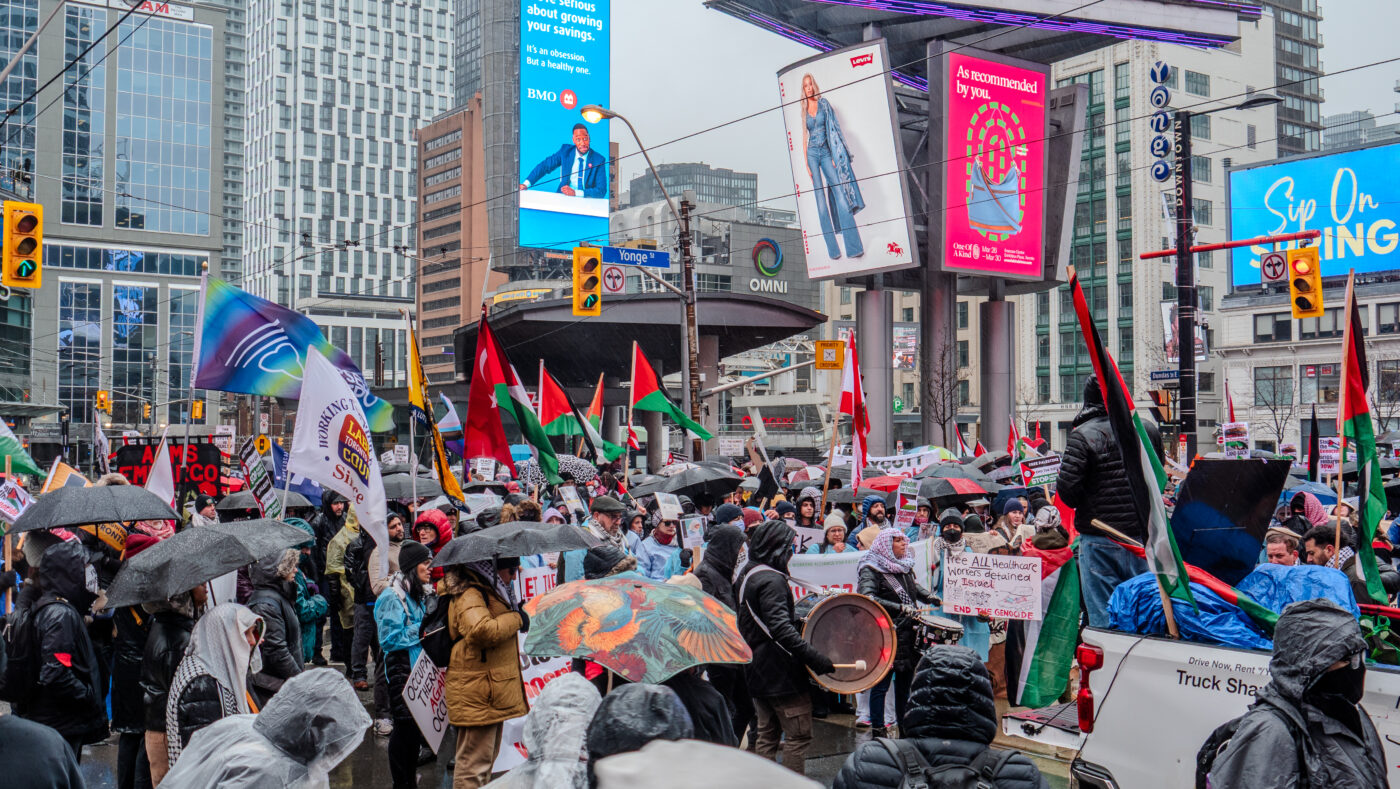THE GREEN LINE
DOCUMENTERS NOTES
Chime in on this controversial demonstration bylaw before it goes to City Council
In a recent community consultation, 90 per cent of attendees voted against a bylaw that would ban protests near “vulnerable institutions.”

Pro-Palestine protest at yonge street and dundas street march 29, 2025.


morgan miya
Curious luddite who firmly believes that community is everything and works towards keeping her neighbourhood of Little Jamaica healthy. Loves to travel the world within Tkaronto.
May 9, 2025
These city meeting notes are part of Documenters Canada. Learn more about our program here.
The City of Toronto has been asking residents how they feel about limiting protests near certain sites. In an online community consultation last week, the overwhelming majority said they “completely oppose.”
Last December, City Council voted to look into a proposed bylaw that would ban protests near “vulnerable institutions such as places of worship, faith-based schools and cultural institutions.”
Similar bylaws have been enacted in cities such as Calgary, Brampton and Vaughan. Those who break the bylaw in Vaughan face fines of up to $100,000.
As part of a report to be reviewed by City Council later this month, staff were directed to consult the City Solicitor, the Toronto Police Service, “other applicable stakeholders” and Torontonians in general. Residents were asked for feedback through community-focused sessions, written submissions and an online survey that was open from March 17 to May 1.
The last public meeting took place on April 30 via Zoom and was conducted by Narrative Research on behalf of the City of Toronto. Over 200 attendees were able to send anonymous messages to the facilitators and vote through polls.
City staff were not present until the end of the session when a high-level summary of the feedback was provided by Narrative Research. This format was chosen because “some people may not feel comfortable expressing their perspectives with staff present,” according to Margaret Brigley, the CEO of Narrative Research.
The facilitators presented a series of multiple-choice and single-choice questions that attendees could answer through polls. Cameras and microphones were disabled and the chat was anonymous.
Twice throughout the meeting, 90 per cent of attendees voted in full opposition of the bylaw. Many even marked that they consider none of the suggested institutions as "vulnerable institutions" in need to be protected in the first place.
We included all the poll questions and responses, below.
After the polls were conducted, James Lapierre, Toronto’s Deputy Chief of Staff, Strategy and Integration joined the meeting. Brigley summarized the feedback from the chats.
“When we asked whether you've experienced challenges visiting and or accessing institutions because of a demonstration in the area, we heard a resounding no,” she said.
“When you come across a demonstration, you told us that you were curious, you were enthusiastic, you were thankful, and for the most part, you did not experience fear or anxiety. Instead, you had experienced a strong sense of community or solidarity,” Brigley added.
Participants were also asked what Toronto can do to ensure people feel safe at or near demonstrations. The responses were:
- Reducing police presence and interference during protests.
- Diverting traffic to protect pedestrians.
- Ensuring that EMS or first aid is present.
- Implementing a better permitting system for demonstrations.
- Letting the community know when demonstrations are happening.
Brigley added that the discussion around vulnerable institutions was focused on children and religion. There was “much discussion about [how] institutions aren't vulnerable, people are vulnerable,” she added.
How you can chime in
You can submit written feedback to City Council on this item once the agenda is posted on May 15.
The report on the proposed bylaw will be discussed at City Council between May 21 and May 23.
Fact-Check Yourself
Sources and
further reading
Don't take our word for it —
check our sources for yourself.
Care about our city, but don't know how to make it better? Sign up for simple, step-by-step guides to solving problems in your neighbourhood — one small action at a time.